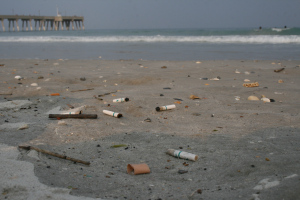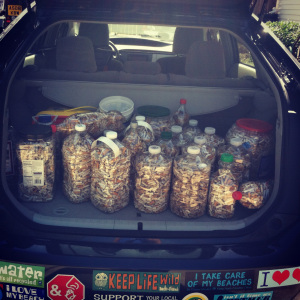By: Anna Manyak, Knauss Fellow with the NOAA Marine Debris Program
Prior to the 1960s, littering was commonplace. For those of us who were not alive during that time and love a good TV show, Mad Men gives us an entertaining glimpse of the everyday practices of this era. If you’re anything like me, you were probably appalled at the episode where the Draper family leaves their trash from a picnic scattered on the ground, with a receptacle in clear sight. Our littering standards have come a long way since then. Today, tossing trash on the street or out a car window is unacceptable and unlawful. However, despite these great strides in litter control, littering of one item in particular continues to be commonplace: Cigarette butts.

Cigarette butts are the last socially acceptable form of litter, and it shows. The next time you’re walking along a busy road or city street, take a look around you – cigarette butts are everywhere. They don’t only impact the terrestrial environment. Land runoff into rivers and streams can bring cigarette butts discarded on land into the marine environment, where they can impact marine organisms and habitats.
Cigarette butts are made of plastic – cellulose acetate to be exact (not cotton, as is sometimes thought). Just like other forms of plastic, cigarette butts do not biodegrade, and can persist in the environment for a long period of time. Additionally, consumption of cigarette butts by unknowing marine organisms can lead to death through choking or starvation. They also contain toxins that can leech into the environment. Some studies have shown that these toxins can have harmful effects on aquatic organisms, and yet, cigarette butts continue to be littered in huge quantities.

Danielle Richardet knows all too well the abundance of cigarette litter in the marine environment. Through her blog ‘It Starts with Me,’ Danielle documents her quest for a cigarette-butt free beach in Wrightsville Beach, North Carolina. Since August 2010, Danielle has taken 20 minutes a couple days a week to stroll the beach and collect litter with her family. Throughout 133 outings, they have collected 262 pounds of trash and 44,211 cigarette butts. In one 20 minute outing, they collected an astounding 2,026 butts. Imagine 2,026 plastic bottles cluttering the beach. That would certainly not be acceptable by our current littering standards, so what makes plastic, toxic cigarette butts acceptable?
Each year the Ocean Conservancy sponsors the International Coastal Cleanup, a worldwide cleanup of litter and debris from waterways. In the past 25 years, ICC volunteers have collected nearly 53 million cigarette butts. In fact, every year, cigarette butts are the number one most collected item during the ICC, sometimes making up around a quarter of the litter and debris collected.
Sadly, the majority of the public are unaware that cigarette butt litter is so pervasive. A recent survey conducted by Legacy®, a non-profit organization that focuses on spreading awareness about the health and environmental impacts of tobacco, found that the majority of people know that cigarette butts are not biodegradable and that they are toxic. However, the majority of those surveyed were unaware that cigarette butts were the most littered item on beaches and roadways annually.
Things have changed since the early 20th century. Today, we know that litter is harmful to the environment. Cigarette butt litter is no different, and it’s time we began treating it that way.
With Earth Day this weekend, it’s a time to celebrate our environment and reconsider actions that can harm it. Do your part and participate in an Earth Day event; spend a couple minutes cleaning up cigarette butts and share some messages about the impacts of the most-collected piece of marine debris. Earth Day is a perfect time to start a conversation about changing some societal norms, and keeping cigarette butts off of the ground, and out of the ocean.
What you can do on Earth Day and every day:
- If you smoke, don’t flick your butt! Place it in a proper receptacle.
- Organize cleanups in your local community (and make sure you document your findings with the Marine Debris Tracker App!)
- Follow Danielle’s lead: be an environmental steward in your own community, and spread awareness about cigarette butt litter.

I would love to talk to someone on the phone about littering on the beach, I am studying this problem and I need more infomation about it. Please give me a phone number and I'll call you, thanks